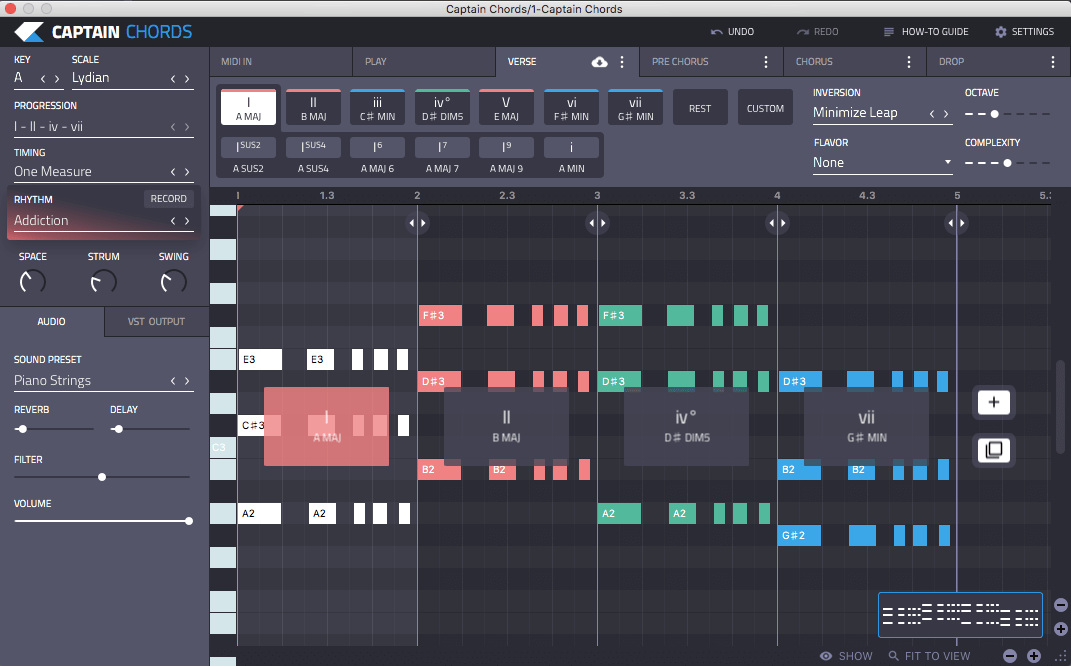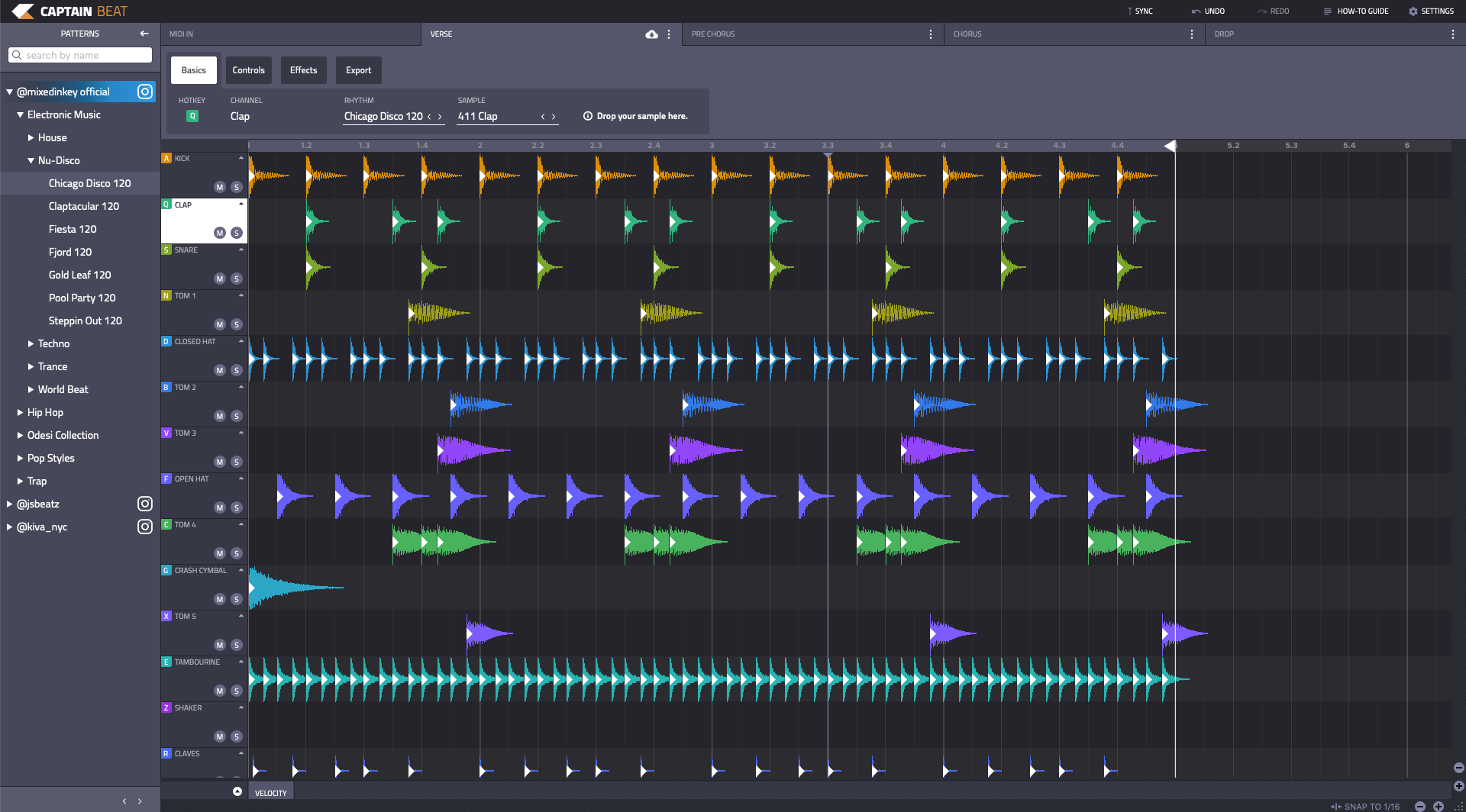How to become a better music producer.

Music production, like chess, or cave-diving, is one of those maddening skills that seems like it should be fairly straightforward, but takes a lifetime to master. And, like any hard-to-master skill, it’s addictive and endlessly rewarding,
Once you’ve started down the music production rabbit-hole, there are many pitfalls, distractions and misdirections that can hold developing producers back. How can we avoid them and find the true path to music production nirvana? What does it really take to become a better producer?
Write chords faster with Captain Chords
- Write your own chord progressions
- Apply rhythms to your chords
- Set your Key and Scale for the entire song
- Explore different chords and discover your favorite combinations
- Compose music and write your own songs
- One touch plays 3 notes of the chords
What is a producer?
The job of a music producer has changed. Since the mass adoption of computers and relatively cheap studio gear, producers are expected to do much more than simply oversee and mix a record. Nowadays, the term ‘producer’ invariably involves the composition, arrangement, mixing and sound design of an entire track. That’s a whole bunch more skills to learn!
In many ways, modern software does make this a little easier – thankfully. There are far more plugins and tools available that help producers achieve things in minutes that would have previously taken years to perfect. As such, it’s not fair to say today’s producers have it any harder, but they do have a plethora of competing skills to acquire if they want to achieve success. It’s unrealistic to expect many producers to be experts in every area, so if you identify any weaknesses, such as piano skills or chord composition, try and find plugins that might help with this, such as Captain Plugins.
1. There’s no ‘easy’ way.
Forget trying to cut corners or find a ‘magic pill’ plugin that will make everything instantly sound great. Mostly, anything that advertises itself as a ‘wonder plugin’ is only good for a handful of fairly common uses, but by no means a good fit for every producer.
The reality is, becoming a better music producer takes many hours of practice, perseverance and application. There’s a common saying in creative practices about the ‘10,000 hours rule’; namely that you have to spend around that long before you can really be good at complex, creative disciplines.
But before those of you with less experience throw in the towel, significant successes can be achieved in a much shorter timeframe. With imagination, a little luck and some good ideas, anyone can create brilliant productions, even on humble equipment.
Boy in Da Corner – the Dizzee Rascal story.

Sometimes it’s much more about your message and energy. In fact, some might say too much technical knowledge can be a burden on your creativity. An example of this is UK artist Dizee Rascal, who composed and produced the entirety of his Mercury Prize-winning album Boy in Da Corner entirely on a Playstation 2! What he lacked in production experience he more than made up for in energy, vitality and freshness of ideas. He had a powerful message and even helped create a brand new genre, Grime.
This illustrates how technical skill does not equal good music. And, in some cases, that initial enthusiasm and energy can be dampened as greater technical knowledge is gained. Suddenly you start to doubt yourself, or worry about sample rates, reverb tails and so on, when before you were only driven by what sounded good to you at the time. It’s true that technical knowledge can sometimes be a constraint, rather than a facilitator. As with most creative disciplines, there are seasons in your development, and the intermediate stage can sometimes seem daunting. Just remember, though; that sought-after state whereby your technical skills can finally, adequately match your ambitions may be just over that particular mountain.
2. Learn to hear.
As we become better producers, better musicians, we evolve new ways of listening to sound. Over time, we begin to hear complexity and nuance in music where previously there was just a ‘whole’ sound. In time, we start to discern instruments, effects, melodies and structures in new ways. And in time, an experienced producer hears such subtleties as stereo spread, compression rates, and other sonic intricacies in great detail. It’s almost a blessing in disguise, as the days of simply listening to a record without dissecting it may be behind you!
Speed up this process in two distinct ways, one pastoral, one practical:
Ensure your production space is equipped for success.
I couldn’t legitimately say you need to spend money on many things to be a good producer. But reasonable quality monitoring and a room space that allows you to accurately hear your work are two things that every good producer must prioritise. Monitor speakers should be of sufficient quality to give you a flat, honest response to your work. That means they should not be ‘Hi-Fi’ style speakers, which are designed to color the sound (in a pleasing way), as pleasing isn’t the same as true. And a good producer needs acoustic truth.
This acoustic truth extends to the room or space you are working in, too. There’s nothing worse than a room full of hard surfaces, nooks and crannies, and with a high ceiling for splattering the frequencies coming out of your speakers like a muck-spreader. Bass travels at a different speed to treble, so reflective surfaces will bounce high frequencies around (and ultimately upwards) much faster than lows. That’s why playing modern music in a church sounds really boomy at ground level. But go up to the eaves and you’ll hear all the missing high frequencies. And none of the bass.
Fixing this kind of problem is, necessarily, a complex task. But, if you can’t choose a perfect space – ie like most of us – there are mitigations we can make. Acoustic foam is inexpensive and very effective at containing reflecting frequencies, as are soft furnishings in general. There is software available, such as these offerings by AcousticField, that can analyse your room and suggest appropriate treatment. And while it’s true that perfecting acoustic treatment is a dark art, a vast improvement to the most challenging room can be achieved with relatively low investment.
PRO TIP
One of the best places to reference music is in a car. The natural acoustics (assuming you have a reasonable stereo) make for amazing sound reproduction.
So, if you can’t afford high-end speakers, or have sound restrictions at home, take a drive to a quiet spot and have a good listen. This method has been used on hit records since the 80s and is still a trusted option.
Listen voraciously, listen critically.
 Photo by Ilias Chebbi on Unsplash
Photo by Ilias Chebbi on Unsplash
Practice makes perfect, right? It’s certainly true when it comes to training your ears. You’ll only improve your own skills by listening intently, and regularly, to music and sound. Talking about it with peers and producers really helps, too. The more you consume, the faster you’ll pick out aspects of a mix, or notes in a melody, which in turn will help you pick out parts of your own work, good and bad, faster. The more accurately you can hear, the better you can respond.
Try listening to music you don’t like, too. Why don’t you like it? What characteristics does it have, and why does that turn you off? Being able to hear what you like and don’t like equally accurately will help you make better production decisions.
3. Absorb expertise.
Sometimes, all you want to do is express yourself, free of concerns about technique and technicality. I’d say, if you’re in that mood, just go for it. You never know what you will come up with!
But if you’re feeling more circumspect, or searching for a solution to a particular problem, there are probably a hundred videos that can help on Youtube. That doesn’t mean they’re all good, but you can usually tell the good ones from the comments. Try and find a couple of tutorial-makers who you feel comfortable with. I personally find You Suck at Producing explains things in a clear, concise and often amusing way. But there are hundreds of great video-makers, in multiple languages, too.
Another way to absorb expertise is to collaborate, remix or sit in on a session. In these times of Covid-19, online communication might be the simplest option, and can be equally valuable. With more and more software enabling instant, real-time collaboration, it’s possible to feel as if you’re in the same room as a peer producer. You can discuss techniques, ask questions and get new ideas instantly.
Remixing for others can also be illuminating. By accessing the stems of a successful producer, you can get a feel for how they achieved the sound quality and compositional aesthetics of their track. Which, in turn, can inform your next track. Even better, if you can get project files for your chosen DAW, you can see exactly how the track was crafted.
4. Avoid distractions.
We all start out in music production because it’s fun. It can be a sociable experience with friends chilling while you make beats, and that can be really exciting. But if you’re serious about being the best you can be, know when to go it alone. Alone from friendly interruptions (and the ‘extra-curricular’ temptations that often come with such interruptions), and alone from social media interruptions, too. It’s hard to focus when you’re checking your socials every few minutes!
Of course, everyone is different, and some of us thrive on the atmosphere of a busy room, while others find it distracting. Find your perfect production state, and stick to it wherever possible.
Dance to the beat of a different drum machine.
Captain Beat 5.0: The Ultra-Modern Beatmaking Plugin
- Mix and match rhythm patterns per-channel
- Hundreds of high-quality drum sounds
- Play and record rhythms with computer keyboard or MIDI controller
- Sophisticated MIDI editing
- Add your own samples
- Wave-form visualizer
- Advanced audio and MIDI export options
5. Hit a block? Try a new workflow.
Sometimes, ideas are in short supply. Or, you find yourself laboring over a particular sound or mix aspect, and after a while, feel a little under-enthused. It happens to us all.
When I feel like that, I like to switch up my workflow. Whether in a drastic way, such as using a synth or drum machine I’ve never used before, or simply starting a project melody-first (I usually go chords or drums first), a change can be as good as a rest. Trying new ways of working also forces our brains to break out of their comfort zones, which can be challenging, but ultimately result in exciting new ideas. Something as simple as deciding to use that synth you’ve never properly explored can quickly nspire you to new ideas. Likewise, using a different drum machine can lead you into new and exciting territory. At the end of the day, production can be a repetitive task, so anything you can do to keep it fresh will keep you fresh, too.
6. Share you work.
Depending on your personal nature you may be mre or less comfortable sharing your latest work. If you’re a little shy, remember that we do this for people to hear, appreciate and enjoy our productions. Music is about socialising, and becoming a successful music producer involves some degree of networking. Get your music out there, communicate with others and look for opportunities. Great opportunities are often around the corner you nearly gave up before reaching. This is not an easy pursuit to get good at, o succeed at. But it is possible, and anyone can do it!
7. Take breaks.
Even full-time, professional producers need to keep smiling as they go – otherwise what’s the point? If you’re not loving it, take a break and come back to it. Likewise, your ears will get fatigued during long sessions, so go do something else for a bit if you start losing focus. It can be a different musical task, or, probably better, something completely different. A breath of fresh air can be a real, er, breath of fresh air for your music production!
Enjoy it!
Ultimately, there is no easy way to become a better music producer. As you develop, you will have highs and lows, moments of confidence and clarity, and periods where you feel overwhelmed by the whole process. Keep smiling, if you can, and remember this is something we do, primarily, because we love it. Success is masured in different ways by different people, and we can’t all be Grammy-winners. Becoming a better music producer isn’t easy, but developing proficient skills in such a complex discipline is hugely rewarding.
About the author:


